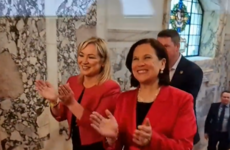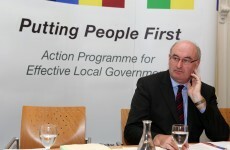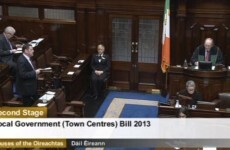# local government
Advertisement
Last month
March 2024

circular economy
New national plan to manage and prevent waste in Ireland to be launched today
1 Mar
13.2k
34
This year
2024

FACTCHECK
FactCheck: People registered to vote don’t need to reapply or submit ‘additional information’
19 Jan
8.3k
Last year
2023

local government
Limerick to vote for Ireland's first directly elected mayor in 2024
25 Jul 2023
6.0k
15

Water quality
Dozens more inspectors needed to tackle the 'wicked problem' of farm water pollution
18 Jun 2023
15.1k
48

The Daily Poll
Poll: Is there enough coverage of NI elections across the island?
21 May 2023
15.7k
31

Northern Ireland
Sinn Féin storming ahead in historic Northern Ireland local election
20 May 2023
30.5k
20

Limerick
Gardaí begin enquiries into 'alleged breaches of the Local Government Act' in Munster region
10 May 2023
19.9k

livestreaming
FG councillor taking legal advice as she claims council is 'blocking' broadcasting meetings
Updated
2 Feb 2023
11.1k
6
All time

Explainer
A useful guide to Ireland's planning system and how to have your say on proposed developments
9 Oct 2021
14.7k
11

Voices
Michael Pidgeon: Why the left - including Sinn Féin - should support property taxes
Michael Pidgeon
2 Jun 2021
20.5k
68

local government
Government signs-off on plan for directly elected mayor for Limerick
20 Apr 2021
6.1k
10

local government
Maternity leave for councillors to be examined by all-female group
29 Mar 2021
10.6k
33

local government
Over €140,000 given to 23 projects to help women and people from minority groups become councillors
14 Dec 2020
10.7k
21

New Rules
Amsterdam has banned tour groups from sex workers’ windows in red light district
13 Feb 2020
51.2k
46

Cabinet
Cabinet approve citizens' assemblies on gender equality and Dublin's local government
11 Jun 2019
9.8k
31

Voices
Opinion: Directly elected mayors would be good for democracy
Deiric Ó Broin
21 May 2019
10.8k
36

Gender Quotas
Call to tackle 'significant underrepresentation' of women in senior council roles
29 Nov 2018
10.3k
68

Voices
Opinion: Cutting constituency sizes will cut left wing councillors by 75% and women by 25%
Oliver Moran
7 Nov 2017
11.4k
60

Voices
Opinion: Ireland's weakness is a lack of indigenous businesses
Professor Eoin O'Leary
29 Sep 2017
6.0k
42

local government
Councillors across the country are getting a pay rise (except for ones in Dublin, Cork and Galway)
24 Jan 2017
12.8k
48

Read all about it
Plans to merge libraries criticised as 'wholly shoddy and unacceptable'
25 Jan 2015
13.3k
54

engineers
Workers threaten to strike over Roscommon Council's 'bullyboy tactics'
9 Jan 2015
15.1k
24

irish deaf society
Advocacy service for deaf people closes after funding cut, leaves '5,000 at risk'
1 Jul 2014
8.5k
31

Cost of business
Ibec aren't a political party, but if they were, this is what their local election manifesto would say
21 Apr 2014
8.8k
38

COMMERCIAL RATES
Local authorities haven't collected over €355 million owed to them
31 Mar 2014
8.5k
19

Phil Hogan
Local authorities get cash to spruce up public spaces ahead of tourist season
18 Mar 2014
9.8k
67

Dissolution threat
Donegal councillors have to agree a budget next Monday - or they'll be removed
8 Jan 2014
9.3k
46

local government
Local government model and funding to "change considerably" this year
3 Jan 2014
7.9k
39

local government
Local Government Fund expenditure estimated at €1.21bn this year
16 Nov 2013
4.0k
8

local government
"Arrogant" Phil Hogan's visit to be greeted with protest by Letterkenny councillors
6 Nov 2013
7.8k
50










